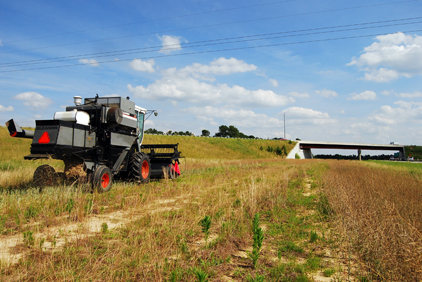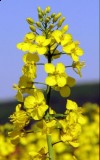From a press release from the North Carolina Department of Transportation:
A small field of bright yellow flowers planted by the N.C. Department of Transportation along Interstate 40 may look like any other bed of wildflowers, but in the case of this crop, there is more than meets the eye. Two weeks ago, NCDOT harvested these flowers – actually canola plants – with the aim of turning them into fuel for diesel engines. The plants are part of a pilot program with N.C. State University to research the feasibility of growing bio-fuel crops on highway rights of way.
Modeled after a Utah-based initiative called Freeways to Fuel, the program, which recently garnered national attention, is unique in that it utilizes land otherwise unsuitable for food crops or livestock. Geographic Information System (GIS) mapping tools are used to find suitable locations to grow crops on NCDOT rights of way. Through this partnership, NCDOT plants and maintains the crops while N.C. State, which has a growing bio-fuels program, conducts research on the plantings.
“The biodiesel program is one example of our department’s overall commitment to creating a more livable, sustainable future in North Carolina,” said Transportation Secretary Gene Conti. “We are constantly exploring innovative ways to realize this vision, whether we are using alternative fuels like bio-diesel and solar power, conserving energy at the state’s first green rest area or recycling construction materials.”
The N.C. program is in its second year, and this year’s crop, totaling just under 10 acres, consisted of four plots of canola grown along roadways in Raleigh, Faison, Mount Airy and Rutherford County. N.C. State will process the crop using specialized equipment designed to extract oil from the canola seeds to make bio-diesel.

“This program is an excellent example of what can be done through a successful partnership, and gives us the opportunity to work with the university to explore the feasibility of growing bio-fuel,” said state roadside environmental field operations engineer Ted Sherrod, who chairs the biofuels research project. “Bio-diesel plants like canola and sunflower produce beautiful blooms that make our roadsides more attractive, and beyond that, provide a source of cleaner-burning fuel.”
NCDOT and N.C. State experimented with sunflowers last year as the program’s inaugural crop with yields averaging almost 550 pounds of sunflower seed per acre. After processing, it is possible to generate about 40 gallons of biodiesel from each acre of sunflowers.
N.C. State researchers calculated that the cost of bio-diesel production would equal the cost of purchasing gasoline or diesel fuel, and have less environmental impact. Biodiesel crops require minimal maintenance, along with possessing aesthetic value.
NCDOT is committed to reducing its reliance on fossil fuels and improving air quality in North Carolina by using bio-diesel in its diesel powered fleet. Currently, the department’s entire diesel powered fleet uses B20 bio-diesel, a mixture made up of 20 percent bio-fuel and 80 percent ultra-low sulfur diesel fuel. Since 2006, the department estimates it has saved approximately 4 million gallons of fossil fuel by using bio-diesel fuel, and for every gallon of bio-diesel used, the amount of particulate matter released into the air is reduced by 20 percent.




This is great. Everything helps, and since it can be made into something useful, I approve of the double use, saving money and land as well.
This is good news, provided they are not using petrochemical pesticides on these crops. The DOT persists in using Roundup (glyphosphate) despite repeated reports of illness and volumes of science that speak to the health and environmental dangers from this poison. Roundup is sprayed and washed into our drinking water.
“A 2008 study confirmed that the adjuvants in Roundup formulations kill human cells, particularly embryonic, placental and umbilical cord cells, even at very low concentrations. These researchers found that Roundup formulations cause total cell death within 24 hrs” (see info@beyondpesticides.org)
For our health and our desperate economy, now is the time to stop the poisoning and the premeditated random homicide.